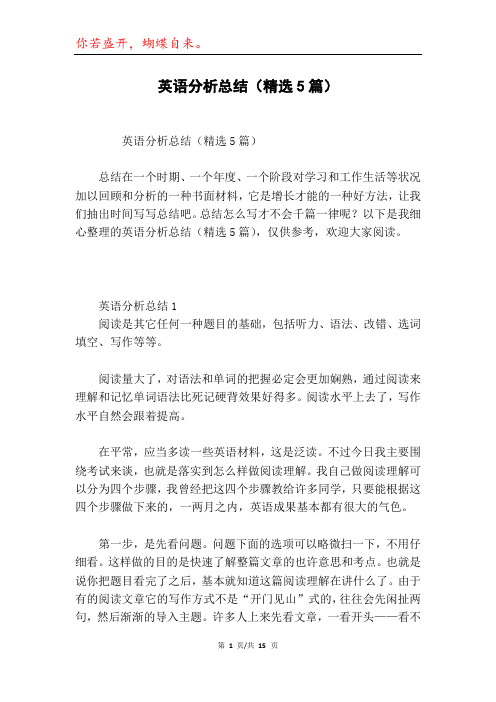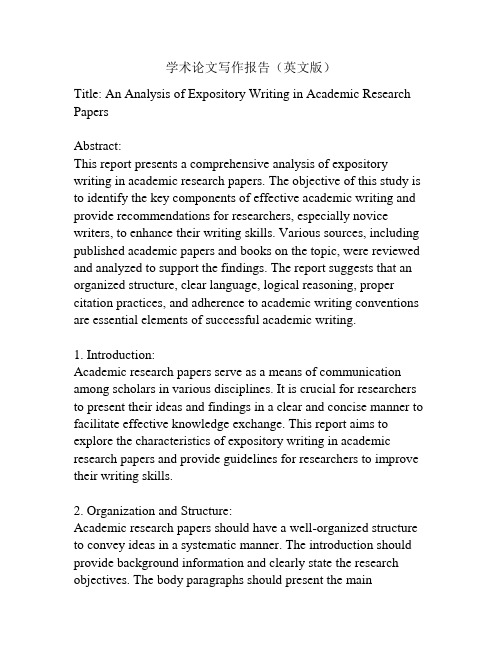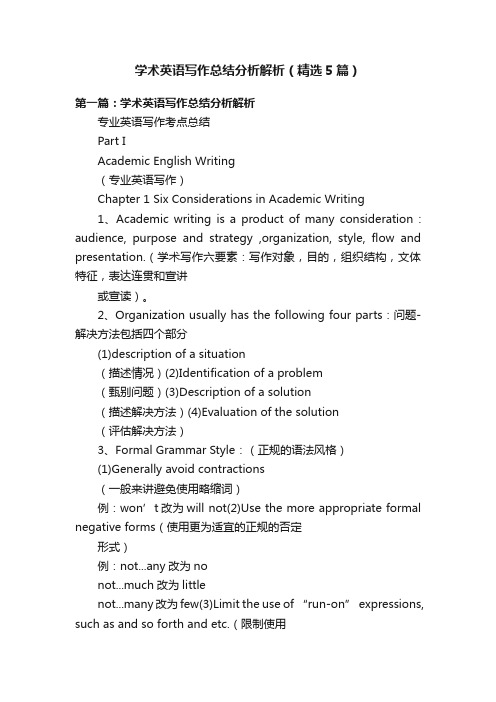学术英语的写作的总结分析报告解析汇报
学术论文写作英语总结

学术论文写作课程总结科研的进步在于科研工作之间交流,讨论,阅读。
在第一节课,老师就告诉我们,面对全球众多的科研工作者来说,本领域学者之间的交流多以文字的形式进行。
英语作为世界各国人们交流的一种流通语言,让那些非英语为母语和以英语为母语国家的科研人员不会对我们投稿的英语学术论文所要表达的内容产生歧义,才能达到学术交流与进步的目的。
在本次的英语学术论文写作课程学习中,我们组经历了第一次的细致分工,到以后的分工与合作相结合的进步。
由于我的研究方向为InSAR监测矿区,在本次论文写作中主要负责我们‘空天地一体化矿区环境灾害监测’中D-InSAR监测矿区部分的实验以及数据分析的工作。
同时,在小组汇报的过程中共同进行了第一部分Introduction 部分的汇报,完成了Authors and Keywords部分PPT的制作与汇报工作。
从选择汇报PPT模板、搜集资料、总结资料,再到最后制作修改完成终稿,最后是台下的汇报演练,每个步骤的实践经历都给了我弥足珍贵的经验。
回首这学期本门课程的学习,我发现自己在慢慢地积累中有了很多的收获。
首先,作为一个学制只有2年的工程硕士,在本学期已经完成了自己学位论文的开题工作,在下一个学期就要着手于自己学位论文的撰写工作。
无论是发表期刊论文,还是撰写自己的学位论文,插入、添加参考文献都曾经是写作的一大难题。
本次课程老师给我们介绍了几款文献管理器(Noteexpress,Endnote)。
通过对文献管理器软件的学习与使用,让我熟悉了文献管理器,在本学期的其他专业课程中的论文写作中已经可以熟练使用,极大的方便了论文写作。
其次,语料库的检索分析,制定自己论文写作方向,都对我的论文写作有着十分重要的作用。
接着就是自己关于学术论文写作方面的收获。
从第一节课开始,老师给我们写学术论文的正确态度,给初入学术写作的我论文写作方面奠定了很好的基础。
原来对英语论文的态度就是从中文的论文通过翻译软件直接进行翻译。
英语分析总结(精选5篇)

英语分析总结(精选5篇)英语分析总结(精选5篇)总结在一个时期、一个年度、一个阶段对学习和工作生活等状况加以回顾和分析的一种书面材料,它是增长才能的一种好方法,让我们抽出时间写写总结吧。
总结怎么写才不会千篇一律呢?以下是我细心整理的英语分析总结(精选5篇),仅供参考,欢迎大家阅读。
英语分析总结1阅读是其它任何一种题目的基础,包括听力、语法、改错、选词填空、写作等等。
阅读量大了,对语法和单词的把握必定会更加娴熟,通过阅读来理解和记忆单词语法比死记硬背效果好得多。
阅读水平上去了,写作水平自然会跟着提高。
在平常,应当多读一些英语材料,这是泛读。
不过今日我主要围绕考试来谈,也就是落实到怎么样做阅读理解。
我自己做阅读理解可以分为四个步骤,我曾经把这四个步骤教给许多同学,只要能根据这四个步骤做下来的,一两月之内,英语成果基本都有很大的气色。
第一步,是先看问题。
问题下面的选项可以略微扫一下,不用仔细看。
这样做的目的是快速了解整篇文章的也许意思和考点。
也就是说你把题目看完了之后,基本就知道这篇阅读理解在讲什么了。
由于有的阅读文章它的写作方式不是“开门见山”式的,往往会先闲扯两句,然后渐渐的导入主题。
许多人上来先看文章,一看开头——看不懂,不知道想要说什么,然后就晕了头,后面的内容也就跟着糊里糊涂起来。
所以我们先看题目,知道全文大意和考点,即使看文章的时候有些地方看不懂,也影响不大了。
其次步,就是仔细的把全文阅读一遍,然后做题。
这前面两部,是我们做阅读理解的常规步骤,在考场上,也就根据这两个步骤来就不错了。
完成者前面那个步骤,每篇文章需要用的时间也许是12分钟。
但是,在平常练习中,也这样做收效不大。
由于只阅读一遍,看个半懂不懂,糊里糊涂的选择几个选项,然后对一下答案。
这样我们花了时间,实际上没有什么收获。
花了许多时间做了许多英语题目,却还是停留在原来的水平。
所以说在平常练习中,既然做了一篇,就要吃透一篇,理解一篇,收获一篇。
学业英文作文总结报告

学业英文作文总结报告英文:As a student, academic performance is always a top priority for me. Throughout my academic journey, I have learned various strategies and techniques to improve my grades and overall academic performance.One of the most important things I have learned is the importance of time management. Proper time management allows me to balance my academic responsibilities with my personal life, ensuring that I have enough time to study, complete assignments, and participate in extracurricular activities. For example, I use a planner to schedule my study time and set deadlines for assignments, which helps me stay on track and avoid procrastination.Another important aspect of academic success is effective note-taking. I have found that taking organized and detailed notes during lectures and readings helps meretain information better and makes studying for exams much easier. I also use various note-taking techniques, such as mind maps and Cornell notes, to help me better understand and remember the material.In addition to time management and note-taking, I have also learned the importance of seeking help when needed. Whether it's asking a teacher or tutor for clarification on a difficult concept or joining a study group, seeking help can greatly improve academic performance. For example, I once struggled with a difficult math concept and sought help from my teacher, who was able to explain it in a way that made sense to me.Overall, academic success requires a combination of hard work, dedication, and effective strategies. By implementing these strategies, I have been able to maintain a high GPA and achieve my academic goals.中文:作为一名学生,学业表现始终是我最重要的优先事项。
英语学术汇报总结和自我工作反思

英语学术汇报总结和自我工作反思山东成武县党集中学:朱坤峰能够有机会参加今年在日照举办的《山东省教育学会外语教学研究专业委员会第十四次年会》,首先要感谢以袁校长为核心的校领导对我们外语学科的重视和对我本人教学工作的大力支持,能够有外出学习的机会,我感到无比的荣幸,同时也充满着对学校领导的无比感激,带着校长的嘱托,我踏上了去日照的征途,同时也感到身上胆子的沉重,在学习中我不敢有丝毫的松懈和轻松,做到认真抓好每一个学习和提高自己的机会,针对这次年会的情况,我向学校领导和各位老师汇报如下。
本次年会是围绕着“打造高效课堂”展开的,日照市市委朱先亮,山东教育教学研究室主任高洪德,和省英语教研员张涛就本次年会做了致词。
外语研究协会鲁子问教授针对当前外语教学的主体思想和发展方向做了详细的阐述,并进行了《中小学英语学习成效提升策略系列》专题讲座,针对当前英语知识目标过高,而能力目标过低的问题做了分析。
就学习成效问题,结合词汇学习、任务型阅读、和任务型写作,近几年山东省的部分高考试题做了细致的评估和分析。
下午观看了浙江某小学的课堂实录和课后听课组从不同角度的评课活动,详细的记录了外语教学的新模式。
次日上午,莱芜市、青岛市和烟台市教研员分别就今年的省高中组优质课,初中优质课和小学组优质课的评选活动做了详细的汇报,就各参赛选手过硬的个人专业素质和高超的授课技术做出了肯定,同时也指出了不足。
优点:各选手都能注意到教学观念的转变,都能让学生带着问题去自读,都注意了学生自主学习能力的培养,都能做到对教材深层的挖掘和创造性的使用教材,教学目标明确,处理问题方法得当,较好的拓展了学生的思维空间,教师个人基本素养较高,指令性语言简洁,流畅,口语表达能力较强,都重视了知识的梳理和归纳,使学生的情感态度和价值观都有了新的改观。
缺点和不足:个别老师课堂导入不好,环节处理上不够衔接,讨论还只是单纯的只为活跃课堂气氛,有的急于让学生抢答,而忽视了给学生留够充分的思维问题的空间,有的没有考虑对学生的分层教学,不能抓住学生的兴趣点,老师一人唱独角戏的情景还是时有出现,针对学生的回答,只是给出简单的Yes或No,very good 等来草率的回复学生,评价缺乏针对性。
学术英语 课文总结

学术英语课文总结引言学术英语是指用于学术交流、学术写作和学术研究中的英语。
对于希望在国际学术领域有所建树的学者和研究人员来说,掌握学术英语非常重要。
在学术英语课程中,我们深入研究了一系列相关的课文,下面将对其中的一些重要课文进行总结和讨论。
课文一:What is Academic Writing?这篇课文讨论了什么是学术写作以及学术写作的一些特点和要求。
它提到了学术写作的目的是为了向同行学者传达研究成果,并引用其他学者的观点和研究来支持自己的论点。
学术写作还要求准确、简明地表达思想,避免使用口语化的语言和词汇。
这篇课文给了我深刻的启示,让我明白了学术写作和其他类型的写作之间的区别。
在今后的学术研究中,我会努力提高自己的学术写作能力,以便更好地与其他学者进行交流和合作。
课文二:Research Proposal研究计划是学术研究的起点,它描述了研究的目的、方法和预期结果。
这篇课文介绍了研究计划的几个组成部分,包括研究背景、问题陈述、研究方法和预期结果。
通过学习这篇课文,我学会了如何撰写一个清晰、有逻辑的研究计划。
我了解到研究计划应该包含充分的背景信息,明确研究的目标,并提供详细的研究方法和预期结果。
这将对我以后的学术研究非常有用。
课文三:Citing and Referencing这篇课文讲述了学术写作中引用和参考文献的重要性和规范。
它指出了为什么需要引用其他学者的作品,并提供了一些引用的常用方法和格式。
学习这篇课文让我明白了引用和参考文献的作用。
通过引用他人的观点和研究成果,我们可以为自己的论证提供更多的证据和支持。
同时,正确格式的参考文献可以使读者更容易找到我们引用的来源,并增加我们的可信度。
课文四:Academic Vocabulary词汇是学术写作中的重要组成部分。
这篇课文介绍了一些常用的学术词汇,并提供了一些方法来扩展自己的学术词汇量。
通过学习这篇课文,我意识到学术词汇的重要性。
使用准确、专业的词汇可以使我们的论点更清晰、更有说服力。
学术论文写作报告(英文版)

学术论文写作报告(英文版)Title: An Analysis of Expository Writing in Academic Research PapersAbstract:This report presents a comprehensive analysis of expository writing in academic research papers. The objective of this study is to identify the key components of effective academic writing and provide recommendations for researchers, especially novice writers, to enhance their writing skills. Various sources, including published academic papers and books on the topic, were reviewed and analyzed to support the findings. The report suggests that an organized structure, clear language, logical reasoning, proper citation practices, and adherence to academic writing conventions are essential elements of successful academic writing.1. Introduction:Academic research papers serve as a means of communication among scholars in various disciplines. It is crucial for researchers to present their ideas and findings in a clear and concise manner to facilitate effective knowledge exchange. This report aims to explore the characteristics of expository writing in academic research papers and provide guidelines for researchers to improve their writing skills.2. Organization and Structure:Academic research papers should have a well-organized structure to convey ideas in a systematic manner. The introduction should provide background information and clearly state the research objectives. The body paragraphs should present the mainarguments in a logical and coherent way, supported by relevant evidence. Finally, the conclusion should summarize the findings and provide implications for further research.3. Clarity of Language:Clear and concise language is fundamental in academic writing. Researchers should aim to convey their ideas in a straightforward manner, avoiding jargon and unnecessary complexity. Using simple and precise language helps readers understand the content more easily and efficiently.4. Logical Reasoning:Academic research papers should exhibit a clear and logical flow of thoughts and arguments. Each paragraph should be logically connected to the previous and following ones, and the overall structure should guide readers through the research process. Using appropriate transitions and connecting phrases can improve the coherence and readability of the paper.5. Citation Practices:Proper citation practices are crucial in academic writing to acknowledge the contributions of other researchers and avoid plagiarism. Researchers should meticulously cite all the sources they have referred to using a recognized citation style, such as APA or MLA. Failure to properly cite sources can result in academic dishonesty and reputational damage.6. Adherence to Academic Writing Conventions:Academic writing follows specific conventions, such as using the third person, avoiding personal opinions, and maintaining a formaltone. Researchers should familiarize themselves with these conventions and ensure their papers adhere to them to maintain the integrity and credibility of their research.7. Conclusion:Effective academic writing requires attention to various elements, including the organization and structure of the paper, clarity of language, logical reasoning, proper citation practices, and adherence to academic writing conventions. Novice researchers can benefit from understanding and implementing these key components, ultimately enhancing the quality and impact of their research papers. Continuous practice and seeking guidance from experienced researchers can further improve their writing skills. 8. Recommendations:To further improve academic writing skills, researchers should actively engage in peer-review processes, attend writing workshops and conferences, and seek feedback from their mentors and colleagues. Writing groups and online forums dedicated to academic writing can also provide valuable support and guidance. In conclusion, this report highlights the importance of expository writing in academic research papers and provides recommendations for researchers to enhance their writing skills. By adhering to the identified key components, novice researchers can produce high-quality academic papers that contribute to the advancement of knowledge in their respective fields.9. Key Components of Effective Academic Writing:9.1. Organization and Structure: A well-organized structure is a key component of effective academic writing. It helps readersnavigate through the research paper and understand the flow of ideas. Researchers should ensure that their papers have a clear and logical structure, including an introduction, body paragraphs, and a conclusion. The introduction should provide the necessary background information and context for the research, as well as clearly state the research objectives. The body paragraphs should present the main arguments or findings supported by relevant evidence and analysis. Finally, the conclusion should summarize the key findings and provide implications for future research.9.2. Clarity of Language: Clarity of language is crucial in academic writing. Researchers should strive to communicate their ideas in a clear and concise manner to ensure that readers can easily understand the content. The use of jargon and unnecessary complexity should be avoided. Instead, researchers should use simple and precise language to convey their ideas effectively.9.3. Logical Reasoning: Logical reasoning is a fundamental component of academic writing. Researchers should present their arguments in a logical and coherent manner, providing evidence and analysis to support their claims. Each paragraph should flow logically from one idea to the next, and there should be a clear connection between different sections of the paper. The use of appropriate transition words and phrases can help improve the coherence and readability of the paper.9.4. Proper Citation Practices: Proper citation practices are essential in academic writing to acknowledge the contributions of other researchers and avoid plagiarism. Researchers should carefully and accurately cite all the sources they have referred to intheir papers. This includes both in-text citations and a comprehensive reference list at the end of the paper. Different citation styles, such as APA, MLA, or Chicago, have specific guidelines that researchers should follow. Failure to properly cite sources can have serious consequences, including academic misconduct and damage to one's reputation.9.5. Adherence to Academic Writing Conventions: Academic writing follows certain conventions and standards that researchers need to adhere to. These conventions include using the third person, maintaining a formal tone, and avoiding personal opinions unless specifically requested in certain types of papers, such as opinion or reflection pieces. Researchers should familiarize themselves with the specific conventions of their field or discipline and ensure that their writing aligns with these expectations. Adhering to academic writing conventions helps maintain the integrity and credibility of the research.10. Recommendations for Enhancing Academic Writing Skills: 10.1. Seek Peer Review: Peer review is a valuable process for improving academic writing skills. Researchers should actively seek feedback from their peers and colleagues. They can join writing groups or engage in peer review exchanges to receive constructive criticism and suggestions for improvement. Peer review provides an opportunity to identify areas of weakness or confusion in the writing and make necessary revisions.10.2. Attend Writing Workshops and Conferences: Writing workshops and conferences offer researchers the chance to learn from experts in the field and gain insights on effective academicwriting techniques. These events often provide practical tips, strategies, and resources for improving writing skills. Researchers should take advantage of these opportunities to enhance their writing abilities.10.3. Seek Feedback from Mentors and Colleagues: Seeking feedback from experienced mentors and colleagues can be incredibly helpful in improving academic writing skills. These individuals can provide valuable insights and guidance based on their own experiences. Researchers should actively seek their feedback on drafts and revisions to refine their writing.10.4. Practice Regularly: Like any skill, academic writing requires regular practice to improve. Researchers should set aside dedicated time for writing and make it a habit. Regular practice allows researchers to develop their own writing style, become more comfortable with academic writing conventions, and refine their ability to convey complex ideas clearly.10.5. Utilize Writing Resources: Various writing resources are available to researchers to enhance their writing skills. Academic writing books, online tutorials, and writing guides can provide guidance on grammar, style, and organization. Researchers should take advantage of these resources to expand their knowledge and improve their writing.10.6. Seek Guidance from Writing Centers: Many universities and institutions have writing centers or writing support services that offer individualized assistance to researchers. These centers provide guidance on various aspects of academic writing, such asstructure, language, and citation practices. Researchers should utilize these resources to receive specialized support and feedback on their writing.In conclusion, effective academic writing requires attention to various key components, including organization and structure, clarity of language, logical reasoning, proper citation practices, and adherence to academic writing conventions. Novice researchers can enhance their writing skills by implementing these components and by actively seeking feedback, participating in workshops, and practicing regularly. With time and effort, researchers can improve their ability to communicate their ideas effectively through well-crafted academic research papers.。
英文分析报告的格式范文模板

英文分析报告的格式范文模板
前言
英文分析报告是用英文书写的分析文档,用于总结、分析某一特定主题或问题。
本文将为您介绍英文分析报告的格式范文模板,帮助您更好地撰写和组织英文分析报告,为您的英文写作提供参考。
1. 概览
在英文分析报告的开头,应该包含报告的标题、撰写日期、撰写人员等基本信息。
同时,简要介绍报告的背景和目的,为读者提供总体了解。
2. 研究背景
此部分应详细描述研究背景,包括相关研究领域的现状、研究主题的重要性、
以及研究问题的提出。
3. 研究方法
详细介绍研究所采用的方法论,包括实验设计、数据收集方式、分析工具等。
4. 数据分析与结果
在此部分,根据研究目的和问题,对所获得的数据进行分析,并展示结果,包
括图表、统计数据等。
对结果进行客观的解读和分析,突出研究的主要发现。
5. 结论与建议
总结研究的主要结论,突出研究的贡献和局限性,并提出相应的建议或展望。
6. 参考文献
列出报告中引用的所有文献、数据来源等参考资料,确保报告的可信度和学术性。
结语
以上就是英文分析报告的格式范文模板,通过按照以上结构组织报告内容,可以使报告更加清晰、逻辑性更强。
希望这份模板能够对您的英文写作有所帮助。
祝您写作顺利!。
学术英语写作总结分析解析(精选5篇)

学术英语写作总结分析解析(精选5篇)第一篇:学术英语写作总结分析解析专业英语写作考点总结Part ІAcademic English Writing(专业英语写作)Chapter 1 Six Considerations in Academic Writing1、Academic writing is a product of many consideration : audience, purpose and strategy ,organization, style, flow and presentation.(学术写作六要素:写作对象,目的,组织结构,文体特征,表达连贯和宣讲或宣读)。
2、Organization usually has the following four parts : 问题-解决方法包括四个部分(1)description of a situation(描述情况)(2)Identification of a problem(甄别问题)(3)Description of a solution(描述解决方法)(4)Evaluation of the solution(评估解决方法)3、Formal Grammar Style:(正规的语法风格)(1)Generally avoid contractions(一般来讲避免使用略缩词)例:won’t改为will not(2)Use the more appropriate formal negative forms(使用更为适宜的正规的否定形式)例:not...any改为nonot...much改为littlenot...many改为few(3)Limit the use of “run-on” expressions, such as and so forth and etc.(限制使用多个词连用的表达法)例:句子内不能出现and so forth和etc.出现时应将省略的部分扩展出来。
- 1、下载文档前请自行甄别文档内容的完整性,平台不提供额外的编辑、内容补充、找答案等附加服务。
- 2、"仅部分预览"的文档,不可在线预览部分如存在完整性等问题,可反馈申请退款(可完整预览的文档不适用该条件!)。
- 3、如文档侵犯您的权益,请联系客服反馈,我们会尽快为您处理(人工客服工作时间:9:00-18:30)。
专业英语写作考点总结Part ІAcademic English Writing (专业英语写作)Chapter 1 Six Considerations in Academic Writing1、Academic writing is a product of many consideration : audience, purpose and strategy ,organization, style, flow and presentation.(学术写作六要素:写作对象,目的,组织结构,文体特征,表达连贯和宣讲或宣读)。
2、Organization usually has the following four parts : 问题-解决方法包括四个部分(1)description of a situation (描述情况)(2)Identification of a problem (甄别问题)(3)Description of a solution (描述解决方法)(4)Evaluation of the solution (评估解决方法)3、Formal Grammar Style:(正规的语法风格)(1) Generally avoid contractions (一般来讲避免使用略缩词)例:won’t改为will not(2)Use the more appropriate formal negative forms (使用更为适宜的正规的否定形式)例:not...any改为no not...much改为little not...many改为few (3)Limit the use of “run-on”expressions, such as and so forth and etc. (限制使用多个词连用的表达法)例:句子内不能出现and so forth和etc.出现时应将省略的部分扩展出来。
(4)Avoid addressing the reader as you(except, of course, if you are writing atextbook or other instructional materials).(避免向读者说“你”)例:You can see the results in Table 1.改为:The results can be seen in Table 1.(5)Be careful about using direct questions. In some fields they are common, while inothers they are not.(使用直接引语时需谨慎)例:What can be done to lower costs?改为:It is necessary to consider how costs may be lowered.或者We now need to consider how costs may be lowered. (6)Place adverb within the verb. (将副词放于动词词组内)例:This model was developed by Krugman originally.改为:This model was originally developed by Krugman.(7)Consider whether you should split infinitives.(考虑是否该使用割裂不定式)例:We need to adequately meet the needs of those enrolled in the program.(8)Aim for an efficient use of words. (目的是为了有效地使用词汇)例:There are some inorganic materials that can be used by bioengineers in theprocess of tissue engineering that have been shown to be very promising.改为:Some inorganic materials used in tissue engineering have shown greatpromise.习题:(1)You can use this model to analyze the effects of several parameter changes.错误:使用了you。
改为:This model can be used to analyze the effects of several parameter changes.(2)OK, what are the reasons that coffee prices have fallen? There’re a lot ofpossibilities.错误:使用了口语OK;直接引语的使用;使用了缩略词There’re。
改为:Coffee prices have fallen for many reasons.(3)You can see the difference between these two approaches to designingunderground subway stations clearly.错误:使用了you;将副词clearly放在了句尾。
改为:The difference between these two approaches to designing undergroundsubway station can clearly be seen.(4)Recent research has shown that the arms are used commonly for protectionduring a fall to the ground.错误:将副词commonly放在了动词之后。
改为:Recent research has shown that the arms are commonly used for protectionduring a fall to the ground.(5)So far, there hasn’t been any comprehensive study l ooking into the role ofsmiling in getting the initial trust of individuals.错误:使用了So far;使用了there be 结构;使用了not...any结构;使用了非正式的looking into。
改为:To date, no comprehensive study has examined the role of smiling in gaining the initial trust of individual.(6)There are some studies that have concluded that bamboo could be used bybuilders more widely than it is now as a construction material.错误:使用了there be 结构;副词widely 位置放错。
改为:Some studies have concluded that bamboo could be more widelyusedthan it is now as a construction material.(7)These special tax laws have been enacted in six states: Illinois, Iowa,Ohio,etc.错误:使用了etc。
改为:These special tax laws have been enacted in six mid western states: Illinois,Iowa, Indiana, Ohio, Michigan, and Minnesota.(8)There isn’t very much research on the use of oil palm shell as coarse aggregatein the production of concrete.错误:使用了there be 结构;使用了not...very much。
改为:Little research has been done on the use of oil palm shell as coarse aggregate in the production of concrete.Chapter 2 Two Underlying Structures in AcademicWriting(专业写作的两个基本结构)1、Two underlying structures in academic writing:(专业写作的两个基本结构)(1) general-specific structure (泛论-特指(GS)结构)(2) problem-process-solution structure (问题-过程-解决方法)2、GS texts usually begin with one of the following:(GS文本通常以下列一种形式开始)(1)A short or extended definition (简短或拓展定义)(2)A contrastive or comparative definition (对比或比较定义)(3)A generalization or purpose statement (一般化或目标性陈述)(4)A statement of fact. (事实陈述)3、Super ordinate-category word:technique, method, process, device, and system.(超级坐标词)4、Deletions(删除):在下列情况下,你可以减少限制性关系代词A. 定语从句仅有关系代词、be动词、一个或多个介词短语B. 定语从句由被动态动词加上一些额外的信息C. 定语从句含有关系代词、以-ble结尾的形容词和额外的信息(1). metal that is often used —> metal often used(2). device that is capable of —> device capable of(3). roof which is on top of —> roof on top of(4). precipitation which results from —> precipitation resulting from(5). This sentence cannot be reduced.(6). flute that is pitched an octave higher ---> flute pitched an octavehigher(7). a process that involves the selective transport—> a processinvolving the selective transport(8). a celestial body which has approximately the same mass —> acelestial body with approximately the same mass5、考题类型:句子排序例题:P276、Comparative Definitions(对比性定义)(1)比较定义基本上有两类:1) 呈现一个概念是如何随着时间的流逝而变化的这样一种史实陈述。
